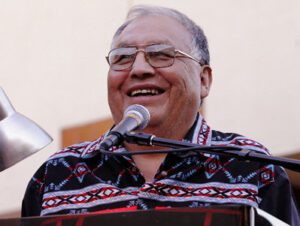Little Bear addresses language preservation
Little Bear addresses language preservation
By Clara Caufield,
NSNT Correspondent
On March 24 and 25, 2022, the Annual American Indian Higher Education Consortium (AIHEC) Language conference was held via ZOOM, attracting about 110 participants from around the country. The focus was on tribal language preservation.
Dr. Richard Littlebear, Northern Cheyenne and President of Chief Dull Knife College, Lame Deer, Montana was the keynote speaker and part of the closing ceremonies which featured five prominent Native poets. “The conference was a great success, helping raise awareness, providing inspiration and building commitment to tribal language preservation,” he commented.
Littlebear credited AIHEC with doing a wonderful job to plan, coordinate and conduct the event, specifically, Jurgita Antoine, staffer for her work. AIHEC is committed to this effort, plans already underway for the 2023 event which will be open to all. For more information visit the AIHEC website,
Dr. Littlebear, nationally recognized as a leader in the field of tribal language preservation is often called upon to speak about tribal language efforts, his life-long passion. He made the following encouraging remarks, which represent his primary message a while back, now recorded and available on UTube, reprinted here with his permission.
“One of the things that make us Cheyenne is our language. It knits everything together: Cheyenne people, culture, land flora and fauna. It translates our culture, our stories and helps pass that to the next generation.
Our language is dying. Once language goes, a lot of who we are as Cheyenne will also go. Once our language goes, we will still look like Cheyenne. We will still sing song and do ceremonial rituals. But what puts it all together is our language.
We will carry on our most sacred rituals, but in a foreign language. That, to me, is a very big desecration.
It is very, very important that we maintain our language – and that we continue to participate in the language.
Most of our speakers are from 60-80 years old. So, the language is dying out very rapidly.
I would like for all the speakers or potential speakers to study Cheyenne, both orally and in the written form, preferably orally first so they can learn the sounds.
“Don’t worry about nay-sayers who say you are not speaking it right. Everybody makes mistakes. I’ve been a life-long speaker of Cheyenne. I still make mistakes in Cheyenne. And I’ve been a life-long speaker of English as well and still make mistakes.
Don’t let that discourage you. When we go to the Last Camp, we will see our ancestors, meet and greet them. Many of our ancestors did not speak English.
If that is the only reason you can think of to speak Cheyenne, it’s a very good reason. It gives you hope to keep speaking Cheyenne so when you greet your ancestors you can do it in a tongue we are all familiar with. Clara Caufield can be reached at acheyennevoice@gmail.com.
The post Little Bear addresses language preservation first appeared on Native Sun News Today.

